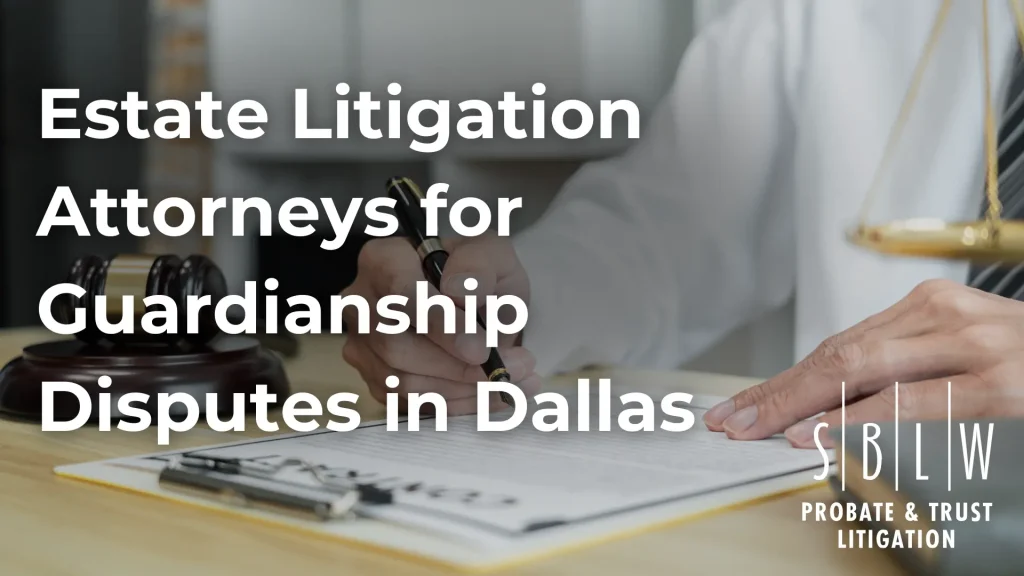
The decision to establish guardianship for someone you love is not one that anyone takes lightly, however necessary it may be. Yet this process can become even more emotionally challenging and complex when other family members choose to contest the guardianship. This could happen because they believe that someone else should have been appointed guardian or because they do not believe that the person in question needs to have a guardian at all.
If you are part of a family currently in dispute about the designation of a guardian, you need the help of a lawyer with extensive experience in estate litigation. The skilled and trusted Dallas estate litigation attorneys of Staubus, Blankenship, Legere and Walker PLLC have previously helped many Texas families in guardianship disputes. We have a thorough understanding of guardianship litigation laws and know how to resolve differences between family members while advocating for your loved one’s best interests.
Call our offices today at (214) 833-0100 or contact us online for a confidential consultation to find out what your legal options are.
What Is a Guardianship?
A guardianship is a legal relationship established by a court, in which one person becomes the guardian, or decision-maker, for an incapacitated individual called the “ward.” The ward is generally someone unable to manage their own finances or care for themselves. They can be a senior citizen with dementia, a mentally or developmentally challenged adult, or a minor.
Guardianships of Person and Estate
A guardianship involves two aspects: guardianship of the person and guardianship of an estate. The same person may be appointed to serve in both roles. While parents or co-conservators of a child can serve as guardians together, most other cases allow for only one guardian at a time.
- Guardian of the person – This role requires an individual to make personal and medical decisions for the ward. This means they are responsible for the ward’s physical care, including housing, food, healthcare, and educational needs.
- Guardian of the estate – This role requires an individual to care for the ward’s financial interests, including income, expenses, assets, and liabilities.
How Do Courts Decide Who Is Appointed Guardian?
In Texas, courts assign guardianships via a top-down approach that prioritizes family members over non-family individuals.
If the ward is an adult, courts will assign guardianship in the following order:
- The person whom the ward designated to have guardianship before the ward became incapacitated
- The ward’s spouse
- A non-relative individual whom the court deems satisfactory as an appropriate guardian.
If the ward is a minor, the courts will assign guardianship in the following order:
- Parents
- The person the last surviving parent has designated for guardianship of the child
- The nearest ascendant to the child after the parents (generally a grandparent, an aunt, or an uncle)
- A non-relative individual whom the court deems satisfactory as an appropriate guardian
In any case, if more than one person qualifies as guardian, the court will determine which candidate will be in the ward’s best interests.
What Are the Responsibilities of a Guardian in Texas?
The state of Texas requires that a guardian must meet certain legal responsibilities. They are held to high standards of behavior when it comes to their duty of care for the ward.
Responsibilities may include:
- Posting a bond for an amount determined by the court and taking an oath swearing that they will fulfill their responsibilities and duties. This bond is an insurance policy designed to protect the ward’s assets if the guardian takes actions that create financial loss to the ward’s estate.
- Moving estate assets in the best interests of the ward.
- Providing for the ward’s needs to the extent allowed by the ward’s resources
- Filing an annual account of the estate’s annual receipts and disbursements.
- Filing an inventory of the ward’s assets.
- Requesting permission and approval of the court for certain actions taken on behalf of the ward.
Disputing the Need for a Guardianship
Not everyone in a family will agree that the individual in question needs a guardian. Certain family members may assert that the intended ward retains the necessary mental capacity to make decisions and to take care of themselves and their finances. The experienced attorneys at Staubus, Blankenship, Legere and Walker PLLC have experience working with families to resolve these disputes. We will work with the family members involved to review the necessary facts while keeping the intended ward’s best interests at the center of all conversations.
Contesting the Appointed Guardian
 Even if family members agree that a guardian is necessary for the ward, they may have different ideas about who the appropriate person to serve as guardian should be. If such a case involves an adult, the courts would attempt to appoint the guardian according to the wishes of the ward if they made these wishes known before they became incapacitated.
Even if family members agree that a guardian is necessary for the ward, they may have different ideas about who the appropriate person to serve as guardian should be. If such a case involves an adult, the courts would attempt to appoint the guardian according to the wishes of the ward if they made these wishes known before they became incapacitated.
If no such wishes were expressed, the courts will decide based on the top-down approach outlined above.
However, there are times when family members contest a guardianship because they believe that the person appointed is failing to take adequate care of the ward. If there is reason to believe that the guardian is abusing their power or making careless mistakes regarding the management of the ward’s estate, the guardianship dispute lawyers of Staubus, Blankenship, Legere and Walker PLLC can investigate whether the guardian has behaved appropriately and reasonably.
Contact an Experienced Dallas Estate Litigation Attorney Today
If you and your family are engaged in a guardianship dispute over a loved one, it is essential that you have skilled and knowledgeable legal representation on your side. The experienced estate litigation attorneys at Staubus, Blankenship, Legere and Walker PLLC recognize how emotionally challenging it can be to deal with issues of contested guardianship in Texas. We will work to find a resolution while keeping your loved one’s best interest in mind. We will sit with you and carefully review your issue, and we will offer our advice on what your legal options are.
Call us today at (214) 833-0100 or contact us online to schedule a consultation and let us get to work for you.






